The origins of blues is not unlike the origins of life. For many years it was recorded only by memory, and relayed only live, and in person. The Blues were born in the North Mississippi Delta following the Civil War. Influenced by African roots, field hollers, ballads, church music and rhythmic dance tunes called jump-ups evolved into a music for a singer who would engage in call-and-response with his guitar. He would sing a line, and the guitar would answer.
From the crossroads of Highways 61 and 49, and the platform of the Clarksdale Railway Station, the blues headed north to Beale Street in Memphis. The blues have strongly influenced almost all popular music including jazz, country, and rock and roll and continues to help shape music worldwide.
The Blues... it's 12-bar, bent-note melody is the anthem of a race, bonding itself together with cries of shared self victimization. Bad luck and trouble are always present in the Blues, and always the result of others, pressing upon unfortunate and down trodden poor souls, yearning to be free from life's' troubles. Relentless rhythms repeat the chants of sorrow and pity of lost souls.
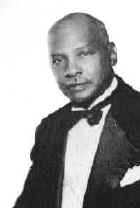 W.C. Handy
W.C. Handy
The blues form was first popularized about 1911-14 by the black composer W.C. Handy (1873-1958).
However, the poetic and musical form of the blues first crystallized around 1910 and gained popularity through the publication of Handy's "Memphis Blues" (1912) and "St. Louis Blues" (1914). Instrumental blues had been recorded as early as 1913. During the twenties, the blues became a national craze. Mamie Smith recorded the first vocal blues song, 'Crazy Blues' in 1920. The Blues influence on jazz brought it into the mainstream and made possible the records of blues singers like Bessie Smith and later, in the thirties, Billie Holiday
The Blues are the essence of the African American laborer, whose spirit is wed to these songs, reflecting his inner soul to all who will listen. Rhythm and Blues, is the cornerstone of all forms of African American music. Many of Memphis' best Blues artists left the city at the time, when Mayor "Boss" Crump shut down Beale Street to stop the prostitution, gambling, and cocaine trades, effectively eliminating the musicians, and entertainers' jobs, as these businesses closed their doors. The Blues migrated to Chicago, where it became electrified, and Detroit.
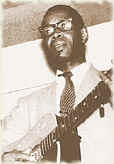 Elmore James
Elmore James
In northern cities like Chicago and Detroit, during the later forties and early fifties, Muddy Waters, Willie Dixon, John Lee Hooker, Howlin' Wolf, and Elmore James among others, played what was basically Mississippi Delta blues, backed by bass, drums, piano and occasionally harmonica, and began scoring national hits with blues songs. At about the same time, T-Bone Walker in Houston and B.B. King in Memphis were pioneering a style of guitar playing that combined jazz technique with the blues tonality and repertoire.
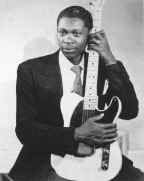 B.B. King
B.B. King
Meanwhile, back in Memphis, B.B. King invented the concept of lead guitar, now standard in today's Rock bands. Bukka White (cousin to B.B. King), Leadbelly, and Son House, left Country Blues to create the sounds most of us think of today as traditional unamplified Blues.
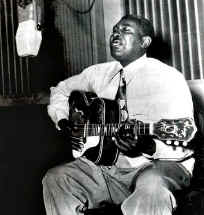 Arthur "Big Boy" Crudup
Arthur "Big Boy" Crudup
Arthur "Big Boy" Crudup, Wyonnie Harris, and Big Mama Thorton wrote and preformed the songs that would make a young Elvis Presley world renown. In the early nineteen-sixties, the urban bluesmen were "discovered" by young white American and European musicians. Many of these blues-based bands like the Paul Butterfield Blues Band, the Rolling Stones, the Yardbirds, John Mayall's Bluesbreakers, Cream, Canned Heat, and Fleetwood Mac, brought the blues to young white audiences, something the black blues artists had been unable to do in America except through the purloined white cross-over covers of black rhythm and blues songs. Since the sixties, rock has undergone several blues revivals. Some rock guitarists, such as Eric Clapton, Jimmy Page, Jimi Hendrix, and Eddie Van Halen have used the blues as a foundation for offshoot styles. While the originators like John Lee Hooker, Albert Collins and B.B. King--and their heirs Buddy Guy, Otis Rush, and later Eric Clapton and the late Roy Buchanan, among many others, continued to make fantastic music in the blues tradition. The latest generation of blues players like Robert Cray and the late Stevie Ray Vaughan, among others, as well as gracing the blues tradition with their incredible technicality, have drawn a new generation listeners to the blues.
W.C. Handy the Father of the Blues wasn't an ordinary Delta bluesman. Handy studied music as a youth, playing the cornet and traveling the South with dance bands playing minstrel and tent shows. Later in life he became a songwriter, bandleader and publisher.
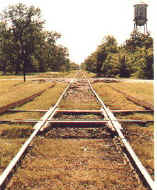 The Southern Cross' The Dog The intersection of the Southern Railroad and the Yazoo & Mississippi Valley Railroad (The Dog) at Moorhead, Mississippi that inspired the singer at Tutwiler.
The Southern Cross' The Dog The intersection of the Southern Railroad and the Yazoo & Mississippi Valley Railroad (The Dog) at Moorhead, Mississippi that inspired the singer at Tutwiler.
Legend is that while waiting for an overdue train in Tutwiler, Mississippi, in 1903 that he heard an itinerant bluesman playing slide guitar and singing about "going' where the Southern cross the Dog," referring to the junction of the Southern and Yazoo and Mississippi Valley railroads farther south near Moorhead. Handy called it "the weirdest music I had ever heard."
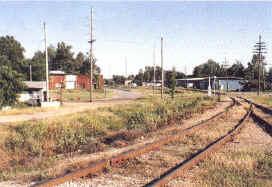 The Crossroads
The Crossroads
In the delta of the Mississippi River, where Robert Johnson was born, they said that if an aspiring bluesman waited by the side of a deserted country crossroads in the dark of a moonless night, then Satan himself might come and tune his guitar, sealing a pact for the bluesman's soul and guaranteeing a lifetime of easy money, women, and fame. They said that Robert Johnson must have waited by the crossroads and gotten his guitar fine-tuned.
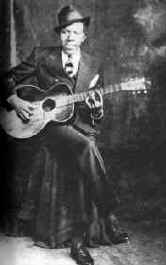 Robert Johnson
Robert Johnson
Not much is known about Johnson other then after the death of his wife in 1930 he decided to become a bluesman. Wandering around the Delta in 1933, he met Son House and Willie Brown. When they heard him play on the guitar startled them. In an amazingly short time, Johnson had turned into a blues guitar master, hence the myth that he made a deal with the Devil.
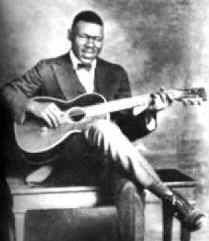 Blind Lemon Jefferson
Blind Lemon Jefferson
Blind Lemon Jefferson was indeed blind, unlike other Delta musicians who merely claimed the limitation. He died penniless in Chicago in December 1929, possibly suffering a heart attack when he became disoriented during a snowstorm.
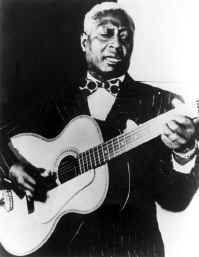 Huddie William Ledbetter aka Lead Belly
Huddie William Ledbetter aka Lead Belly
Leadbelly was a large man, and given to fits of rage. In 1917, he was convicted in Texas for killing a man and in 1930 was convicted of attempted murder in Louisiana. Both sentences were commuted, however, based solely on his musicianship. His "discovery" came, in fact, at Louisiana's Angola Prison Farm
Willie Dixon was certainly the single most important presence on the postwar Chicago scene. What distinguished Willie Dixon from most other Delta bluesmen of his day was his ability to read, write, compose, and arrange music -- talents that were to destine him for legendary status among the bluesmakers. However, it was boxing, not music, that brought Dixon to Chicago in 1936. He was an upstart professional fighter who for a time sparred with the great Joe Louis.
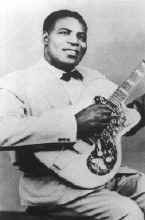
Named after a 19th-century American president, young Chester Arthur Burnett earned the nickname that was to become synonymous with the power of his voice "Howlin' Wolf."
Comment
© 2026 Created by Edie Antoinette.
Powered by
![]()


You need to be a member of I Grew Up In Chicago to add comments!
Join I Grew Up In Chicago